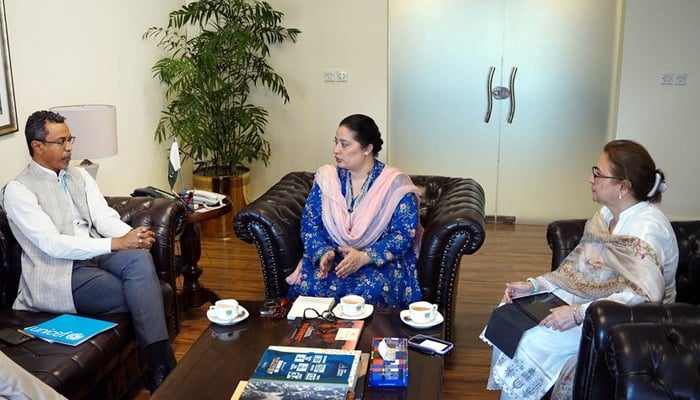Govt, Unicef agree to enhance cooperation against climate change-related disasters
Islamabad:Unicef representative in Pakistan Abdullah A. Fadil on Wednesday called on coordinator to the prime minister on climate change Romina Khurshid Alam here. They agreed to enhance cooperation to safeguard children from the severe impacts of climate change-related disasters, such as floods and diseases.
Romina Khurshid said that the children of Pakistan were increasingly vulnerable to the impacts of climate change, as extreme weather events such as floods, heat waves, droughts, glacial lake outburst floods and shifting rainfall patterns threatened their health, education, and overall well-being.
“What we have learned from recent climate change-caused disasters in Pakistan, is that the country, already one of the most climate-affected countries globally, is experiencing intensified impacts including extreme heat waves, flooding and shifting weather patterns. These climate disruptions are disproportionately affecting children, who are particularly sensitive to environmental changes due to their developing bodies and lower adaptive capacity,” she said.
The aide to the prime minister said addressing the children's climate vulnerability was not possible without targeted interventions, particularly in health, education, water and sanitation sections. She stressed the need for investing in healthcare infrastructure and services to address climate-induced health challenges.
"There is a need for focusing on maternal and child health for strengthening overall health systems, building resilient educational facilities and implementing strategies to ensure that children’s education is not disrupted by climate events so as to ensuring educational continuity, supporting mental health by providing mental health services and psychosocial support to children affected by climate-related stress and trauma, and building resilience of vulnerable communities by prioritising climate adaptation efforts in rural and low-income areas to protect the most at-risk children," she said.
The Unicef’s country representative promised his organisation’s all-out technical and non-technical support to Pakistani government’s efforts for tackling climate vulnerability among children.
-
 Jaden Smith Walks Out Of Interview After Kanye West Question At Film Premiere
Jaden Smith Walks Out Of Interview After Kanye West Question At Film Premiere -
 Why Halle Berry Wasn't Ready For Marriage After Van Hunt Popped Question? Source
Why Halle Berry Wasn't Ready For Marriage After Van Hunt Popped Question? Source -
 Michelle Obama Gets Candid About Spontaneous Decision At Piercings Tattoo
Michelle Obama Gets Candid About Spontaneous Decision At Piercings Tattoo -
 Bunnie Xo Shares Raw Confession After Year-long IVF Struggle
Bunnie Xo Shares Raw Confession After Year-long IVF Struggle -
 Brooks Nader Reveals Why She Quit Fillers After Years
Brooks Nader Reveals Why She Quit Fillers After Years -
 Travis Kelce Plays Key Role In Taylor Swift's 'Opalite' Remix
Travis Kelce Plays Key Role In Taylor Swift's 'Opalite' Remix -
 How Jennifer Aniston's 57th Birthday Went With Boyfriend Jim Curtis
How Jennifer Aniston's 57th Birthday Went With Boyfriend Jim Curtis -
 JoJo Siwa Shares Inspiring Words With Young Changemakers
JoJo Siwa Shares Inspiring Words With Young Changemakers -
 James Van Der Beek Loved Ones Breaks Silence After Fundraiser Hits $2.2M
James Van Der Beek Loved Ones Breaks Silence After Fundraiser Hits $2.2M -
 Disney’s $336m 'Snow White' Remake Ends With $170m Box Office Loss: Report
Disney’s $336m 'Snow White' Remake Ends With $170m Box Office Loss: Report -
 Travis Kelce's Mom Donna Kelce Breaks Silence On His Retirement Plans
Travis Kelce's Mom Donna Kelce Breaks Silence On His Retirement Plans -
 Premiere Date Of 'Spider-Noir' Featuring Nicolas Cage Announced
Premiere Date Of 'Spider-Noir' Featuring Nicolas Cage Announced -
 Pedro Pascal's Sister Reveals His Reaction To Her 'The Beauty' Role
Pedro Pascal's Sister Reveals His Reaction To Her 'The Beauty' Role -
 Kate Middleton Proves She's True 'children's Princess' With THIS Move
Kate Middleton Proves She's True 'children's Princess' With THIS Move -
 Paul Anka Reveals How He Raised Son Ethan Differently From His Daughters
Paul Anka Reveals How He Raised Son Ethan Differently From His Daughters -
 'A Very Special Visitor' Meets Queen Camilla At Clarence House
'A Very Special Visitor' Meets Queen Camilla At Clarence House




